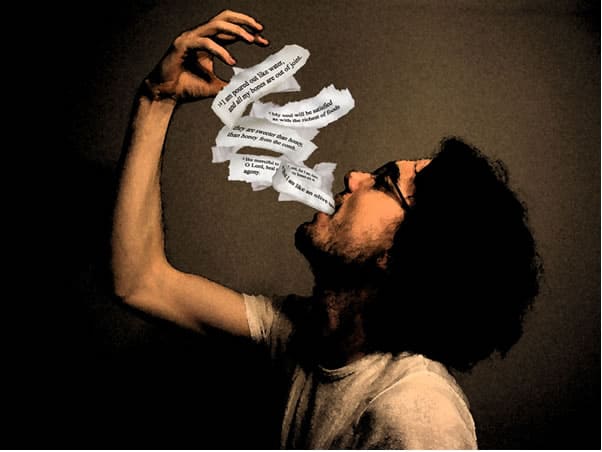Poetic Diction and the New Translation of the Roman Missal
I, too, dislike it.
Reading it, however, with a perfect contempt for it, one discovers in
it, after all, a place for the genuine.
– Marianne Moore, “Poetry”
Poets do not like words. Oh, sure, once the words get strung together in “tuneful order” and “delightful proportion” they sound all right. Once the final product pleases, it gets published, then revised before being anthologized. Take the case of Marianne Moore who spent five decades getting her words to cooperate in the poem “Poetry.” She made several “visions and revisions” until she settled on the three lines above. Still, the dissatisfaction hangs like a cloud. She clearly waged a war with words, the things that Jacques Maritain called “the ungrateful and treacherous material.” The best and brightest poets within the western literary tradition have all complained about their medium. Dante despaired that words might not relate adequately the splendor and glory of his vision of Paradise. Chaucer, too, found that words could not express satisfactorily the nature of true love. T.S. Eliot struggled with what he called the “shabby equipment” of vocabulary in his various “raid[s] on the inarticulate.” Every would-be wordsmith faces the daunting task of wrestling originality, surprise, and depth from the words that are at hand – the well-worn, oft-used, common language of everyday discourse. Painters combine new pigments, sculptors carve new lines, composers hear fresh melodies, but poets are stuck with what we already have at hand – words.
To combat this problem, some poets dip back into the ancient history of the language, sprinkling their verse with words that have fallen out of common usage, and others simply invent words. Shakespeare famously invented several now common words : eyeball, skim milk, addiction, bedroom, and luggage, to name but a few of the nearly 1500 words and phrases coined by the Bard. But the poet cannot stray too far from the beaten path without risking the alienation of the reader or listener. One too many ‘avaunt’s, ‘erelong’s, or ‘eftsoon’s might render a poem unintelligible to the reader. Whereas too many newly coined words creates a private language understood by only the poet. Thus we have the lines of a debate that has raged among poets ever since they first put pen to paper. What is the nature of poetic diction, that is, the peculiar selection and order of words that sets verse apart from prose? In other words, what makes a poem a poem as opposed to just plain prose? The debate has often focused on poetic diction, thus locating the difference between poetry and prose in the poet’s choice of words.
With the publication of the new English translation of the Roman Missal the Church itself has stirred up a bit of contention and debate over the art of choosing words. Reactions to the new translation have been as various and multi-faceted as the Church itself. Some have found the new translation to be more poetic than the previous translation. Among them, Archbishop Timothy Dolan of New York has been “very moved by the more poetic, reverential and uplifting nature of the vocabulary.” Bishop Lennon of Cleveland, likewise, finds it “lyrical and poetic” (italics mine). The Church’s own instruction on translation notes that certain parts of the liturgy are composed in the mode of lyric poetry.
But with this new translation, the Church – consciously or unconsciously – has jumped into the midst of fiercely argued, six hundred year old debate about poetic diction and the nature of poetry. The Church has taken a side in the debate over the very definition of poetry.
But I get ahead of myself. First there is the problem of English in general. Like many modern languages, it is unstable. That is, English is a language constantly adapting and accommodating, still expanding as time goes forward. Although written in a form of English, the language of Beowulf is positively beyond the comprehension of today’s English speaker. The language of Chaucer’s Canterbury Tales, while more familiar to the eye of a contemporary reader, is just as likely to frustrate and bewilder a high school senior poring over his or her Norton anthology. Shakespeare’s language is no better at welcoming the frustrated sophomore faced with Julius Caesar. As the poet Heather McHugh writes in her poem, “The Trouble with ‘In’,” “In English we’re in trouble.” And we’re in trouble because of the slipperiness of words that are always coming in and out of favor, adding to and subtracting from their meaning. In the fourteenth and fifteenth centuries the state of the English language was positively chaotic. Most of the nobility and aristocracy in England spoke French even as late as 1400, and parliament did not make English the official language of the English court system until 1362. English was the language of the streets and fields, a low class lexicon.
In his book, Taming the Chaos: English Poetic Diction Theory Since the Renaissance, Emerson R. Marks traces the debate over the stability of English and the resulting debates over poetic diction. He draws attention to the widely held opinion during the beginning of the Renaissance that English – as well as the other modern European languages – was not a suitable language for intellectual discourse. Not only was English too “hard, harsh, and barbarous” for intellectual nuance, but also it was found ill-suited to poetry. True and beautiful poetry was found only among “the orderly cadences of the Greek and Latin” verses from antiquity. This widely held opinion was not just a symptom of ancestor worship or the awe felt for anything and everything classical. In the Renaissance, according to Marks, “the primary concern of the literary community was whether the modern languages could ever constitute media of poetry to compare with those so magnificently provided by the Greek and Latin.” English had been weighed in the balance and found wanting.
By the late 16th century this widely held opinion faced strong resistance as people came to the defense of the language. Sir Philip Sydney, the poet and critic, professed, “our tongue is most fit to honor Poesie, and to be honored by Poesie.” Then came Shakespeare and Milton; the battle was won. English had found a place alongside the languages of the classics from antiquity. However, as soon as one war came to an end, another took its place: the war over words. What should poetry sound like? What words should be used or not used? Should English poetry try to mimic the sound of the classics or strike out on its own with a vocabulary and a grammar of the everyday practitioner of the language?
Skipping ahead a few centuries, we come to Wordsworth and his groundbreaking book of verse, Lyrical Ballads(1798).1 For English language poets, Wordsworth advocated the use of “the real language of men” as opposed to a more stylized language found only in “poetic diction.” Into the rubbish bin went archaisms and other words found only in poetic diction, words like “somewhither,” “swoopstake,” and “meseems.” Poetic diction, according to Wordsworth, had become corrupt. It had thrust “out of sight the plain humanities of nature by a motley masquerade of tricks, quaintnesses, hieroglyphics, and enigmas.” Of course, Wordsworth did not end the debate over the nature of poetic diction. The debate still rages over which words belong in a poem – the rarified and archaic or the plain and everyday.
And so we come to Liturgiam Authenticam, the Church’s document governing the translation of the liturgy into the vernacular languages, and we see that the Church has taken a stance within this long-running debate over poetic diction. In Liturgiam Authenticam, the Congregation for Divine Worship states its preference for “words or expressions [that] are sometimes employed which differ somewhat from usual and everyday speech” and for “certain manner of speech which has come to be considered somewhat obsolete in daily usage.” Of course, what one might consider “somewhat obsolete” is a matter of opinion. Nonetheless, the Church has clearly decided which side of the poetic diction debate to take up. In Liturgiam Authenticam the authors at the Congregation for Divine Worship take the side of archaisms and the obsolete because the new translation “is not so much a work of creative innovation as it is of rendering the original texts faithfully and accurately into the vernacular language.”
In other words, neither Shakespeare with his penchant for coining new phrases nor Wordsworth and his love of the common language of the everyday person would have been put in charge of translating the Roman missal from Latin into English.
The Church has opted for the other poetic strategy – reliance upon seldom used and rarely heard words. The poetic diction of the new translation looks to the past rather than the present or the future. Within the world of poetry this is a perfectly reasonable choice, as it is primarily a matter of style. Since the chaotic debate over which words are suitable for poetry has not been settled, some poets still choose archaisms where others tend to be more mundane and everyday.
So it might take a while to grow accustomed to “oblation,” “coheirs,” “chalice,” and “partaker,” but no harm is done in returning to a poetic diction from another age. Right? Maybe.
And oughtn’t we note that the new translation of the missal does not belong to the poetic genre? It rests upon theological grounds rather than linguistic ones. In other words, we must still ask about the underlying theology of poetic diction. It’s not enough to look no further than the poetic logic behind the choice of words in the new translation. We must dig deeper and wonder what sort of message about God is communicated through the choice of some words over others.
Editor’s note: the second part of “Words, Words, Words” can be read by clicking here.
— — — — —
- The impact of Wordsworth is best felt by comparing a few of his lines to those of a predecessor. Emerson Marks includes the following comparison in his book Taming the Chaos:
Lo! from the livid East, or piercing North,
Thick clouds ascend, in whose capacious Womb,
A vapoury Deluge lies, to Snow congealed:
Heavy, they roll their fleecy World along;
And the Sky saddens with th’impending Storm.
Thro’ the hush’d Air, the Whitening Shower descends,
At first, thin-wavering; till, at last, the Flakes
Fall broad, and wide, and fast, dimming the Day,
With a continued Flow. See! sudden, hoar’d,
The Woods beneath the stainless Burden bow,
Blackning, along the mazy stream it melts.–James Thompson, “Winter,” (1726)
Five years have passed, five summers with the length
Of five long winters! and again I hear
These waters, rolling from their mountain-springs
With a soft inland murmur.—Once again
Do I behold these steep and lofty cliffs,
Which on a wild secluded scene impress
Thoughts of a more deep seclusion; and connect
The landscape with the quiet of the sky.–William Wordsworth, “Tintern Abbey,” (1798) ↩




